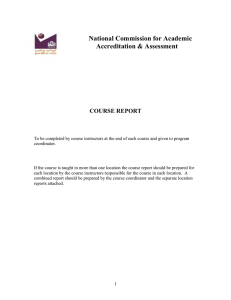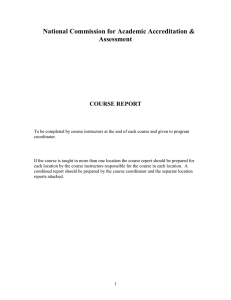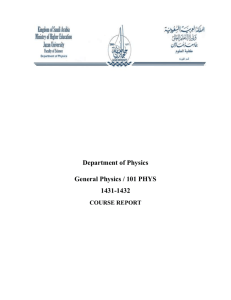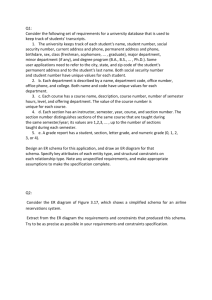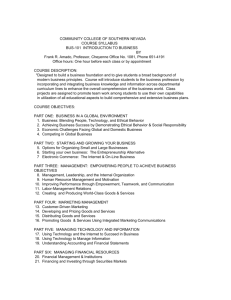Course report 2013-14-I
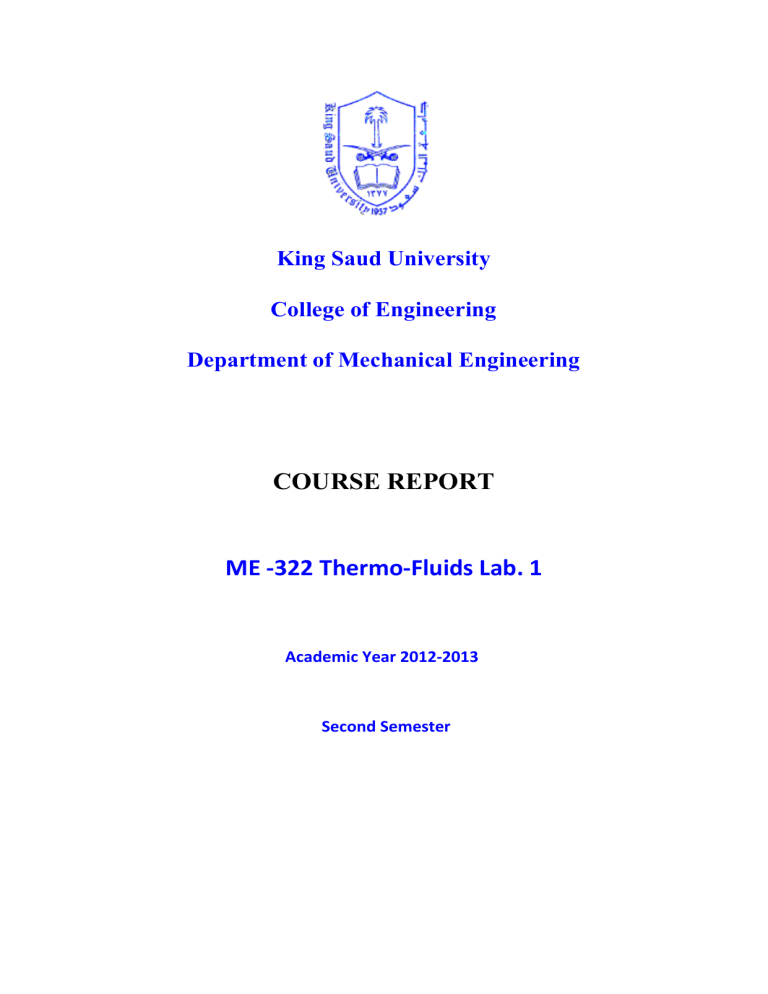
King Saud University
College of Engineering
Department of Mechanical Engineering
COURSE REPORT
ME -322 Thermo-Fluids Lab. 1
Academic Year 2012-2013
Second Semester
Course Report
Institution: King Saud University
College/ Department: Mechanical Engineering Department
A Course Identification and General Information
1. Course title and code: ME322 - Mechanical Engineering Laboratories I
2. If course is taught in more than one section indicate the section to which this report applies
This report pertains to both the sections.
3. Year and semester to which this report applies: Second Semester 2012-2013
4 Location (if not on main campus): Main Campus at Al-Dereya
B- Course Delivery
1 Coverage of Planned Program
Topics
INTRODUCTION: Objectives, Report Writing,
Analyses and Experimental Error
Experimental Error Review
Experimental Analyses and Techniques
Flow Development in Pipes
I.
Pressure Losses
Impact of a Jet
1
1
3
3
3
Planned
Contact
Hours
3
Actual
Contact
Hours
2
Reason for Variations if there is a difference of more than 25% of the hours planned
May occur depending on students questions and answers
1
1
3
4
4
II.
Measurement of drag
Measurement of Thermal Conductivity
Newton’s Law of Cooling - Free Convection
Performance of a Gas Turbine
Performance of a Centrifugal pump
Performance of pumps in series and parallel
Performance of Centrifugal Compressor
COP of Vapor Compression Refrigeration
System
Cooling and De-Humidification of air
2. Consequences of Non Coverage of Topics
N/A
3
3
3
3
3
3
3
3
3
3
0
1
6
0
4
4
1
3
Apparatus malfunction
Lack of time
Topics (if any) not Fully Covered Significance of Lack of
Coverage
N/A
Possible Compensating Action
Elsewhere in the Program
3. Effectiveness of Planned Teaching Strategies for Intended Learning Outcomes set out in the
Course Specification. (Refer to planned teaching strategies in Course Specification and description of Domains of Learning Outcomes in the National Qualifications Framework)
Domains a. Knowledge b. Cognitive
Skills c. Interpersonal
Skills and
Responsibility d. Numerical and
Communication
Skills
List Teaching Strategies set out in Course Specification
Were these
Effective?
Review of important concepts in Thermo-fluids
Application of
Mechanical
Measurements skills.
Perform hands-on experiments in Fluid
Mechanics,
Thermodynamics, Heat
Transfer, Air-
Conditioning and
Refrigeration.
Analyses and solution of practical Thermo-fluid problems
Hands-on operation of experimental equipment.
Verbal discussion with
Professor.
No Yes
Y
Y
Y
Y
Y
Y
Difficulties Experienced (if any) in
Using the Strategy and Suggested
Action to Deal with Those
Difficulties .
Teamwork report in group preparation of one of the experiments
Capability to discuss results and discussion in verbal discussion with
Professor.
Use of internet to e Psychomotor
Skills (if applicable)
N/A
Use of Excel to process data obtain answers to discussion questions
Y
Y
Y
Y Need a strategy to force all group members to participate in the report writing.
This helped some students refine their findings and conclusions
4. Summarize any actions you recommend for improving teaching strategies as a result of evaluations in table 3 above .
C. Results
1 Number of students starting the course:
2 Number of students completing the course:
25
+1
0=
25
22
3 Distribution of Grades (If percentage marks are given indicate numbers in each 5 percentile group)
No % No % No
A 0
4+
95-
100
90-94
0
0
70-74
65-69
6+
0+ B
10+ 85-89 1+ 60-64 0+
D
C
0+ 80-84 3+ < 60 0+
F
Denied Entry
0+
0+
OR
75-79 4+
Denied Entry N/A
In Progress
Incomplete
Pass
Fail
Withdrawn nil nil
53+
0+
1
In Progress
Incomplete
Pass
Fail
Withdrawn
N/A
N/A
53+
0+
1
4 Result Summary:
Group BS Passed:14 = 93.4% Failed 0 =0%
Group AW Passed:53 = 100% Failed 0 =0%
5 Special factors (if any) affecting the results
Did not
Complete 0=0%
Did not
Complete 0=0%
Denied Entry
1=6.6%
Denied Entry
0=0%
Students not adhering to the report formats as well as lack of detailed discussion of results in the first few reports
6. Variations from planned student assessment processes (if any) ( See items C 4 and 5 in the Course
Specification.)
Some of the plans mentioned here were still being developed and are yet to mature or produce results. a.
Variations (if any) from planned assessment schedule (C5 in Course Specification)
Variation Reason b. Variations (if any) from planned assessment processes in Domains of Learning (C4 in Course
Specification)
Variation Reason
7 Verification of Standards of Achievement (Eg. check marking of a sample of papers by others in the department. See G4 in Course Specification) (Where independent report is provided a copy should be attached.)
Method(s) of Verification Conclusion
D Resources and Facilities
1. Difficulties in access to resources or facilities
(if any)
2. Consequences of any difficulties experienced for student learning in the course.
E. Administrative Issues
1 Organizational or administrative difficulties encountered (if any)
2. Consequences of any difficulties experienced for student learning in the course.
The numbers of students in both sections of this course was extremely unbalanced. In one section the number of students was 36 while the other was 17.
The lab session was always late and we had to do two different experiments at the same time to reduce the number of students per experiment.
F Course Evaluation
1 Student evaluation of the course:
(Attach Survey Results if available) a List the most important criticisms and strengths
b Response of instructor or course team to this evaluation
2. Other Evaluation -- What evaluations were received?
Specify and attach reports where available. (eg. By head of department, peer observations, accreditation review, other stakeholders etc): a List the most important criticisms and strengths b Response of instructor or course team to this evaluation
G Planning for Improvement
1. Progress on actions proposed for improving the course in previous course reports:
Actions proposed in the most recent previous course report(s)
1.
Grading scheme change
2.
Divide students into smaller groups
State whether each action was undertaken, the impact, and if the proposed action was not undertaken or completed, give reasons.
A lab report grading sheet was handed to the students at the beginning of the semester to help them write their reports.
This helped the students to improve in the areas that they got low scores in.
This helped the students take more part in the experiment and be more engaged.
2. Other action taken to improve the course this semester/year
Provide a brief summary of any other action taken to improve the course and the results achieved. (For example, professional development for faculty, modifications to the course, new equipment, new teaching
techniques etc.)
3. Action Plan for Next Semester/Year
Continue enforcing late submission policies stringently. Limit the submission period to one week after performing experiment.
Continue using a grading sheet with some refinements for group work.
Increase the theoretical content of the lectures so that students can have a better starting point writing the reports.
Actions Required Completion Date Person Responsible
Jan 15, 2014 Faculty Modify grading sheet
4. Recommendations to Program Coordinator (if Required)
(Recommendations by the instructor to the program coordinator if any proposed action to improve the course would require approval at program, department or institutional level or that might affect other courses in the program.).
Make sure that the number of students in each section is balanced and limited to
16-20 students.
Name of Course Instructors: Dr. Basharat Saleem & Dr. Ali Watry
Signature----------------------------------------Date Report Completed: 20 jan 2014
Received by Program Coordinator Date:________________
Student Learning Outcomes
The Student Learning Outcomes for ME 383 are:
(a) an ability to apply knowledge of mathematics, science, and engineering to mechanical engineering problems
(b) an ability to design and conduct experiments, as well as to analyze and interpret data
(d) an ability to function on multidisciplinary teams
(g) an ability to communicate effectively
(k) an ability to use the techniques, skills, and modern engineering tools necessary for engineering practice.
(l) an ability to work professionally in both mechanical and thermal systems areas.
Course specification main learning outcomes for students enrolled in the course.
1.
Design, execution and evaluation of physical experiments.
2.
Review of important concepts in Thermo-fluids.
3.
Perform hands-on experiments in Fluid Mechanics, Thermodynamics, Heat Transfer, Air-
Conditioning and Refrigeration.
4.
Interpretation and presentation of results.
CO Assessment Tool
E
5
S
4
A
3
M
2
1,2,3,4 Flow Development in Pipes
1,2,3,4 Pressure Losses
1,2,3,4 Impact of a Jet
1,2,3,4 Flow Over an Aerofoil
1,2,3,4 Measurement of
4
Thermal 8
1 2 5 1 5
2 2 2 4 4
5 1 5 2 1
6
6
2
0
2
0
0
0
U
1
Program
Outcomes
Average
Out of 5
Percentage of 60% and above a g d k b
2.21
2.35
3.93
4.64
64
71
93
100
100
Conductivity
1,2,3,4 Cooling and De-Humidification of air
3 6 3 1 1 l 3.63 93

